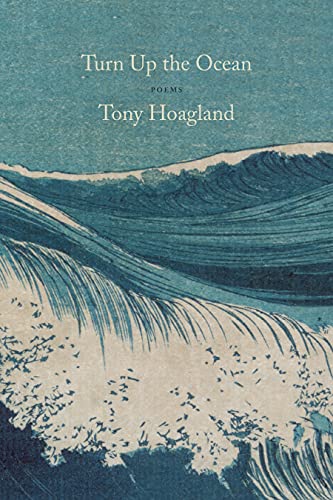Turn Up the Ocean
Turn Up the Ocean
by Tony Hoagland,
Graywolf Press, 80 pages,
paper, $16,
ISBN: 978–1–64445–092–5
“The poem is a house thrown open for ghosts. It wants to be haunted”
— Tony Hoagland, Chautauqua, New York, 2014
I had the fortune of taking a workshop lead by Tony Hoagland at Chautauqua in the summer of 2014. It was intense. Everything that came out of his mouth was quotable. I think I drained two pens of ink over those four days. When I was contemplating this review, I went back to those notes, and the quote above jumped out at me in reflection upon this present collection.
Tony Hoagland died at age 64 on October 23, 2018. Turn Up the Ocean was completed and published posthumously by his wife Kathleen Lee in 2022. She describes the process in the Afterword of the book:
Over the spring and summer before he died, Tony gathered a group of poems — recent and older — into what he imagined as a chapbook, titled Turn Up the Ocean, his final collection . . . . It wasn’t until spring 2020, when I spent a lot of time at home as a consequence of the pandemic, that I felt ready to address his papers — stacks of typed poems, margins crowded with scribbles, and the thickets of drafts in his computer . . . Possibly, a few of the newer poems that I chose to add he would have considered not yet polished enough for a book. But to my mind, the roughness of these poems lends them their luminous intensity.
And it is that roughness of his diagnosis, and his grapple with the certainty of its sentence, that brings the luminous quality to this collection. Of course, his signature, wry sense of humor still shines through, but in a darker light, as in the opening poem “Bible All Out Of Order”:
When my doctor asks what my symptoms are, I tell her
self–pity and a desire to apologize.
She says my insurance policy covers self–pity
but not, unfortunately, remorse.
In the poem “Disclosure Agreement,” Hoagland reveals that
[b]efore I came to work on this planet
I signed a nondisclosure agreement with god
that I would not publicly discuss
what goes on around this place. . . that most angels have bad breath;
the low statistical success rate
of the surgery for transplanting souls.
This a book about dealing with it: end of life, and the world going on, quite a turn from the author of what is, most likely, my favorite book title, What Narcissism Means to Me (2003). There, Hoagland obsessed about the dirty world, and his dirty, semi–compliant place in it. But perspective arrives quite differently in the current book’s title poem “Turn Up the Ocean”
Again and again my heart has been broken
by people who didn’t have what I want;
whom I then accused of refusingto give me all that they had.
When their only fault, I now see,
was not being the trees or the wind or the rain
It is the rough luminosity that haunts this posthumous collection, especially near its end when the ghosts of his fate appear in shifting images and allegories. In the poem “Siberia,” he is a Russian poet exiled in the frozen wasteland. In “Reading While Sick in the Middle of the Night,” he is a medieval knight in a trashy historical novel in which
I hold my mind up like a bundle
out of reach of the pain — as I walk through
the chest–high wash of these waves that push
and tug at my life.
In “The Interfaith Chapel is in The South Terminal,” he becomes a broken traveler:
I will surrender all my frequent–flyer milers
if you will help meto find my tears and drink them.
If you will help me to reach that placewhere I am already
awaiting my arrival.
The journey is a refulgent row across a dark river to the other side, which is only dimly seen. But a sense of acceptance does appear in the book’s final entry — “Peaceful Transition” — where the house is not so haunted, where he contemplates the end of himself, and our species:
It is one thing to think of buffalo on Divisadero Street
of the Golden Gate Bridge overgrown in a tangle of vinesIt is another to open the door of your own house to the waves.
I would end this review with another notation from that 2014
workshop —
There is more danger in the present tense. Insurance has
already been taken out on the past.
— Craig Sipe


